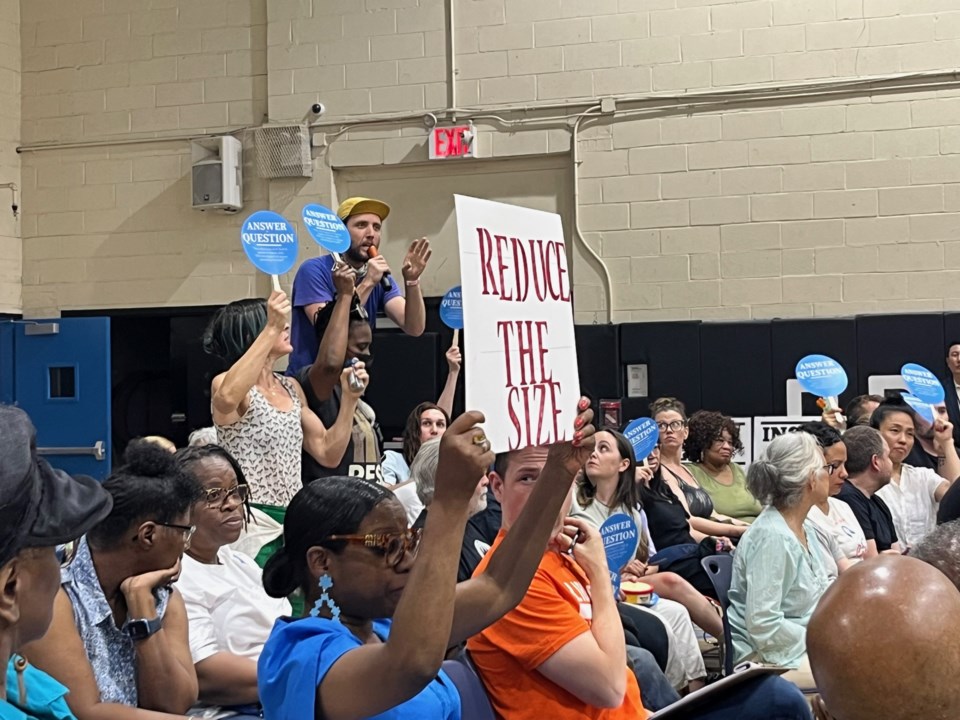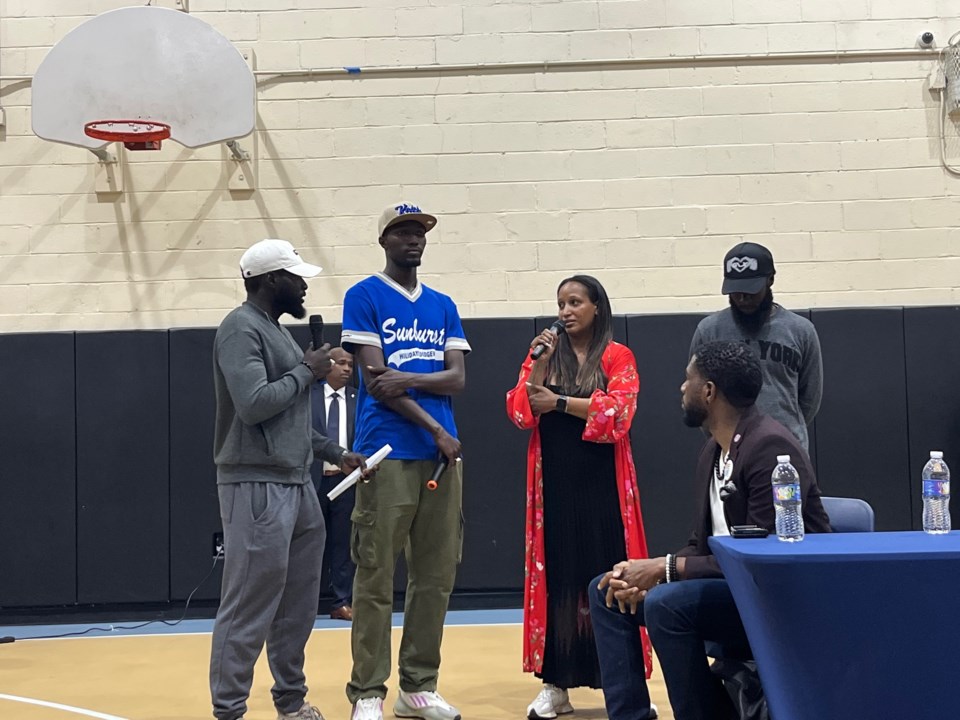At the latest public meeting addressing the city’s emergency shelter complex in Clinton Hill, Brooklyn, one question loomed large: Why was the city still offering emergency procurement contracts for shelter services to for-profit companies?
Around 120 residents packed a gymnasium at Madison Square’s Boys & Girls Club Monday night to air their grievances around the migrant shelters on Hall and Ryerson Streets near the Brooklyn Navy Yard. Residents have been very vocal about their opposition to the size of the complex, where about 3,200 asylum seekers currently reside.
Of the 3,200, around 2,300 are single men, according to NY Attorney General Letitia James, who attended the meeting.
As in past meetings and rallies, residents emphasized how migrants were being warehoused at the shelter complex, and many wanted the shelters’ size reduced or shut down.
City Comptroller Brad Lander, who spoke at the meeting, said he was trying to persuade City Hall to stop using no-bid, emergency government contracts going forward.
“We can’t use contractors without any experience anymore,” he said.
On Tuesday, NYC Mayor Eric Adams said the city will now activate a competitive bidding process for shelter and shelter-related services.
One resident who spoke at the meeting said she was appalled by the amount of money for-profit companies were making, including real estate firm RXR Realty, which reportedly received $45 million to house the Hall Street shelter.
Molly Schaeffer, the director of the mayor’s Office of Asylum Seeker Operations, said the City would be looking for more nonprofit partners, now that we’ve passed the peak of the migrant crisis.
“We are deeply committed to looking at the current shelter contract when the lease is up in March,” Schaeffer said, referring to RXR’s Hall Street contract which expires in March 2025.
Since 2022, more than 200,000 asylum seekers have come to New York City and about 60,000 are currently residing in the emergency shelter system.
Meanwhile, the meeting itself was contentious, as a small group of residents continued to interrupt the speakers.
Councilmember Crystal Hudson, who hosted the meeting and whose district covers Clinton Hill, told the audience that she agreed with her constituents, calling the shelters “inhumane.”
“We are asking the city for more accountability,” regarding how the shelters are managed, Hudson said.
Some residents complained that the elected official had not addressed how the community had changed since the Hall Street shelter opened in 2023, which they said led to an increase in garbage, theft and fights.

“The migrants are hanging out because they have nothing to do, as they can’t get any permits to work,” Hudson responded.
One man, who declined to give his name but said he was part of a group of Hall Street residents that opposed the size of the shelter, stood on his chair and spoke over Hudson using his own microphone and speaker and shouted: “It’s unsafe!”
This led the crowd to boo him, as many residents said they wanted to hear what the elected official had to say.
James, who managed to calm the raucous crowd down numerous times with humor and civility, said she would “in her limited capacity” find a way for her office to provide legal services to the asylum seekers, as well as push for lawmakers in Washington to approve a faster work permitting process.
“I know this is not a community of NIMBYs,” James said. (NIMBY refers to “Not In My Back Yard.”)
Alia McKee Martinez, part of the Hall Street resident’s group, said she wanted the government to step in and “right-size” the shelters.
“Because what we’re doing right now is putting on well-meaning band-aids,” she said.
Other elected officials in attendance included City Council Speaker Adreinne Adams, U.S. Representative Nydia Velzaquez, Public Advocate Jumaane Williams, State Senator Jabari Brisport and State Representative Jo Anne Simon.

Andreia Matay, a volunteer at the nonprofit One Love Community Fridge, was visibly moved as she translated for an asylum seeker from Senegal who addressed the boisterous crowd about his thoughts in French.
“Please do not close the shelter, it is all we have right now,” Matay translated for the young man who appeared to be in his 20s. What’s worse than living in a shelter is living underneath the highway, she added.
Everyone coming to the U.S. is looking for something they cannot have in their own country, Matay translated.
"I wish the community would be less divisive," Matay said after the meeting. "The Hall Street shelter is now someone's home."
Meanwhile, Zac Martin, the pastor at Next Step Community Church in Downtown Brooklyn, told BK Reader he was afraid that City Hall would cut its social services budget for fiscal year 2025, which severely would hamper how he runs the church’s food pantry where many migrants have come to eat on a daily basis.
“The city says it needs help from religious organizations and nonprofits, yet it wants to cut our funding so it feels like a shell game to me,” he said.
Others, like Fort Greene resident Natalie Lowey, asked how each individual could help.
Hudson suggested volunteering at a nonprofit, helping find free legal services, organizing meal distributions and urging lawmakers in Washington to fast track work permits.
“It’s better to lead with love,” she said.
Additional reporting contributed by Sonia Zinkin-Meyers.




